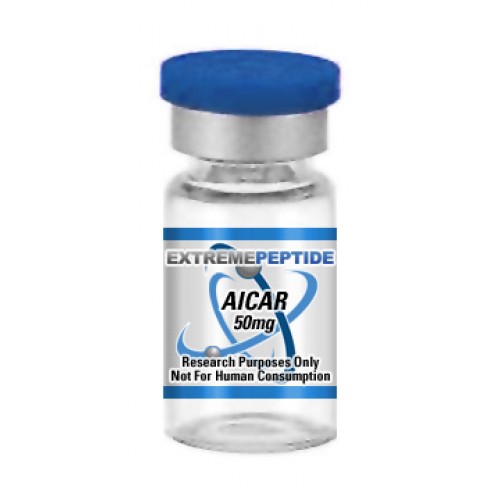AICA Ribonucleotide (AICAR) is a peptide that contains the ability to boost the functionality of the nutrients stores of the cell; the part of the cell that is responsible for energy production. It can go under a host of different names, including:
- ZMP
- Acadesine
- 5-aminoimodozloe-4carboxamide ribonucleotide
How AICA Ribonucelotide Functions
In essence, AICA Ribonucleotide enables an increased amount of blood flow throughout the body, according to scientific research that has been conducted on animal test subjects. This increase of blood flow enables for an elevated instance of oxygen receipt and glucose intake on a cellular level, which then produces a more efficient level of energy and a greater instance of regulated metabolic homeostasis.
From a scientific standpoint, the peptide accomplishes this by entering cardiac cells and stopping the production of adenosine kinase (ADK), an enzyme that serves as a catalyst for the transfer of the gamma-phosphate from ATP to adenosine, which acts as a regulator of aggregations of both extracellular and intracellular adenine nucleotides. AICA Ribonucleotide is also responsible for preventing the production of adenosine deaminase (ADA), an enzyme that breaks down adenosine which is then responsible for the turnover in nucleic acids in tissues. The prevention of the two enzymes enables more processes relating to an increase of blood flow and glucose intake to occur, while at the same time staving off the process of programmed cellular death. Ultimately, this leads to a more efficient and longer-lasting instance of energy conversion.
Benefits of AICA Ribonucleotide
According to laboratory research conducted on animal test subjects, it has been determined that there are a host of benefits that have been tied to AICA Ribonucleotide.
The primary benefit that has been derived pertains to the peptide’s association with cardiac ischemic injury. This particular ailment is caused because of a restriction of blood supply to tissues, which can then cause insufficient amounts of oxygen and glucose to be received on a cellular level. This disrupts proper cellular metabolism, which in turn can significantly hinder an animal test subject’s bodily tissue to remain alive. In a cardiac ischemic episode, this could cause several serious issues, up to and including cardiac arrest.
It is theorized that AICA Ribonculeotide’s ability to increase blood flow and gluclose intake can provide a sense of stability in the event of a cardiac ischemic episode. According to scientific research conducted on animal test subjects, the peptide’s inherent functionality can reduce the risk of heart failure as well as provide a crucial aid in the aftermath of a heart attack.
There are other benefits that have been attached to the peptide as well. For instance, the elevated level in blood flow and glucose intake enables the cells of animal test subjects to convert energy on a much more efficient level, thus providing a longer sense of endurance. This increase in efficiency also translates to an increased ability to break down adipose tissue, which in turn translates to an increased capability to burning fat in animal test subjects, provided that they were kept on a consistent dietary regiment.
Side Effects and Other Concerns
Scientific research on animal test subjects has also determined a few negative side effects in relation to AICA Ribonucleotide. Most of these issues relate to various heart ailments, up to and including cardiac arrest. These negative side effects are primarily tied to the circulatory system of animal test subjects. Because of the higher rate of blood flow efficiency that the peptide creates, the circulatory system would also need to work at an increased efficiency. If this system exhibits signs of struggle when it comes to pumping blood, such as weakness or impediment due to clogging, the stress that the peptide could inadvertently create on the system could potentially cause problems.
Other scientific research on animal test subjects has led to concerns over AICA Ribonucleotide and a potential link to Huntington’s Disease. The theory here is that the peptide’s increase in process efficiency may inadvertently promote the kind of neurodegeneration that is tied to the serious and eventually fatal condition, which is caused in part due to metabolic imbalances on a cellular level. However, it has yet to be determined if the peptide’s functionality protects neurons from the imbalances that it causes.
